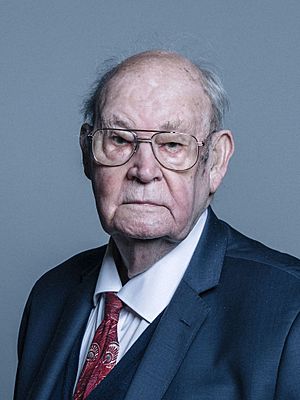Robert Hughes, Baron Hughes of Woodside facts for kids
Quick facts for kids
The Lord Hughes of Woodside
|
|
|---|---|

Official portrait, 2018
|
|
| Shadow Secretary of State for Transport | |
| In office 4 November 1985 – 23 November 1988 |
|
| Leader | Neil Kinnock |
| Preceded by | Gwyneth Dunwoody |
| Succeeded by | John Prescott |
| Parliamentary Under-Secretary of State for Scotland | |
| In office 11 March 1974 – 22 July 1975 |
|
| Prime Minister | Harold Wilson |
| Preceded by | Hector Monro |
| Succeeded by | Frank McElhone |
| Member of the House of Lords Lord Temporal |
|
| In office 15 October 1997 – 7 January 2022 Life peerage |
|
| Member of Parliament for Aberdeen North |
|
| In office 18 June 1970 – 8 April 1997 |
|
| Preceded by | Hector Hughes |
| Succeeded by | Malcolm Savidge |
| Personal details | |
| Born |
Robert Hughes
3 January 1932 Aberdeen, Scotland |
| Died | 7 January 2022 (aged 90) |
| Political party | Labour |
Robert Hughes, Baron Hughes of Woodside (born 3 January 1932 – died 7 January 2022) was an important British politician. He was a member of the Labour Party. For 27 years, he served as a Member of Parliament (MP). An MP is someone elected to represent a group of people in the country's main law-making body, the Parliament.
Lord Hughes was also the leader of the British Anti-Apartheid Movement (AAM). This group worked to end apartheid in South Africa. Apartheid was a system of strict racial separation and discrimination. He led the AAM from 1976 until it closed in 1995. This was after apartheid ended in South Africa.
Becoming a Politician
Robert Hughes first tried to become an MP in 1959. He ran for election in a place called North Angus and Mearns. He came in second place in that election.
Later, he successfully became the MP for Aberdeen North. He held this job for a long time, from 1970 to 1997.
In 1974, he became a Parliamentary Under-Secretary of State for Scotland. This meant he helped the government with matters related to Scotland. However, he resigned from this role in 1975. He disagreed with the government's rules about how much people could earn.
In 1979, there was a big vote in Parliament. This vote was about whether the government should continue to lead the country. Robert Hughes was one of the MPs who voted against his own party's government. This vote helped lead to a new government being formed.
In 1985, Robert Hughes joined the Shadow Cabinet. This is a group of senior politicians from the main opposition party. They act like a "shadow" government, watching over the real government's actions. He became the Shadow Secretary of State for Transport.
In 1997, after leaving Parliament, he was given a special title. He became a life peer, known as Baron Hughes of Woodside. A life peer is someone who is given a title and can sit in the House of Lords. This is the second chamber of the UK Parliament. They hold this position for their lifetime.
Fighting Apartheid
Robert Hughes was very passionate about ending apartheid in South Africa. As the leader of the Anti-Apartheid Movement, he worked hard. The movement pushed the British government to take action against South Africa.
In the 1980s, the AAM wanted the government to stop trading with South Africa. This was called imposing "sanctions." They believed this would pressure South Africa to end apartheid.
A big event organised by the AAM was the 1988 "Free Mandela" concert. This concert celebrated Nelson Mandela's 70th birthday. It took place at Wembley Stadium and was watched by many people around the world. Nelson Mandela was a famous anti-apartheid leader who was in prison at the time.
In 1990, Robert Hughes went to Namibia to celebrate its independence. Namibia had also been under South African control. In 1994, he was an observer at South Africa's first democratic elections. This was a historic moment when all people, regardless of race, could vote.
After the Anti-Apartheid Movement finished its work, Robert Hughes continued his efforts. He became the first leader of a new group called ACTSA: Action for Southern Africa. This group continued to support southern African countries.
About His Life
Robert Hughes was born on 3 January 1932. He went to school at Robert Gordon's College in Aberdeen, Scotland. He also lived in South Africa for several years, from 1947 to 1954. During that time, he worked as a draughtsman, someone who draws detailed plans.
He was a supporter of Humanists UK. This is an organisation that promotes humanism, a way of thinking that focuses on human values and reason.
Robert Hughes passed away on 7 January 2022. He died just four days after his 90th birthday. Many people remembered him fondly. Tony Blair, a former Prime Minister, said he was "a lovely, kind and exceptional man."
 | Anna J. Cooper |
 | Mary McLeod Bethune |
 | Lillie Mae Bradford |

